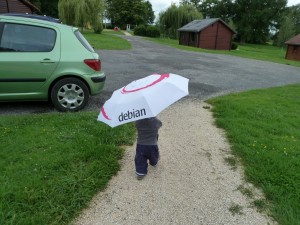Giovanni Mascellani: Having fun with signal handlers
As every C and C++ programmer knows far too well, if you dereference a
pointer that points outside of the space mapped on your process'
memory, you get a segmentation fault and your programs crashes. As far
as the language itself is concerned, you don't have a second chance
and you cannot know in advance whether that dereferencing operation is
going to set a bomb off or not. In technical terms, you are invoking
undefined behaviour, and you should never do that: you are
responsible for knowing in advance if your pointers are valid, and if
they are not you keep the pieces.
However, turns out that most actual operating system give you a second
chance, although with a lot of fine print attached. So I tried to
implement a function that tries to dereference a pointer: if it can,
it gives you the value; if it can't, it tells you it couldn't. Again,
I stress this should never happen in a real program, except possibly
for debugging (or for having fun).
The prototype is
The function is basically equivalent to
word_t peek(word_t *addr, int *success);
return *addr, except that if
addr is not mapped it doesn't crash, and if success is not NULL it
is set to 0 or 1 to indicate that addr was not mapped or
mapped. If addr was not mapped the return value is meaningless.
I won't explain it in detail to leave you some fun. Basically the idea
is to install a handler for SIGSEGV: if the address is invalid, the
handler is called, which basically fixes everything by advancing a
little bit the instruction pointer, in order to skip the faulting
instruction. The dereferencing instruction is written as hardcoded
Assembly bytes, so that I know exactly how many bytes I need to skip.
Of course this is very architecture-dependent: I wrote the i386 and
amd64 variants (no x32). And I don't guarantee there are no bugs
or subtelties!
Another solution would have been to just parse /proc/self/maps
before dereferencing and check whether the pointer is in a mapped
area, but it would have suffered of a
TOCTTOU
problem: another thread might have changed the mappings between the
time when /proc/self/maps was parsed and when the pointer was
dereferenced (also, parsing that file can take a relatively long
amount of time). Another less architecture-dependent but still not
pure-C approach would have been to establish a setjmp before
attempting the dereference and longjmp-ing back from the signal
handler (but again you would need to use different setjmp contexts
in different threads to exclude race conditions).
Have fun! (and again, don't try this in real programs)
EDIT I realized I should specify the language for source code
highlighting to work decently. Now it's better!
EDIT 2 I also realized that my version of peek has problems when
there are other threads, because signal actions are per-process, not
per-thread (as I initially thought). See the comments for a better
version (though not perfect).
#define _GNU_SOURCE
#include <stdint.h>
#include <signal.h>
#include <assert.h>
#include <stdlib.h>
#include <stdio.h>
#include <ucontext.h>
#ifdef __i386__
typedef uint32_t word_t;
#define IP_REG REG_EIP
#define IP_REG_SKIP 3
#define READ_CODE __asm__ __volatile__(".byte 0x8b, 0x03\n" /* mov (%ebx), %eax */ \
".byte 0x41\n" /* inc %ecx */ \
: "=a"(ret), "=c"(tmp) : "b"(addr), "c"(tmp));
#endif
#ifdef __x86_64__
typedef uint64_t word_t;
#define IP_REG REG_RIP
#define IP_REG_SKIP 6
#define READ_CODE __asm__ __volatile__(".byte 0x48, 0x8b, 0x03\n" /* mov (%rbx), %rax */ \
".byte 0x48, 0xff, 0xc1\n" /* inc %rcx */ \
: "=a"(ret), "=c"(tmp) : "b"(addr), "c"(tmp));
#endif
static void segv_action(int sig, siginfo_t *info, void *ucontext)
(void) sig;
(void) info;
ucontext_t *uctx = (ucontext_t*) ucontext;
uctx->uc_mcontext.gregs[IP_REG] += IP_REG_SKIP;
struct sigaction peek_sigaction =
.sa_sigaction = segv_action,
.sa_flags = SA_SIGINFO,
.sa_mask = 0,
;
word_t peek(word_t *addr, int *success)
word_t ret;
int tmp, res;
struct sigaction prev_act;
res = sigaction(SIGSEGV, &peek_sigaction, &prev_act);
assert(res == 0);
tmp = 0;
READ_CODE
res = sigaction(SIGSEGV, &prev_act, NULL);
assert(res == 0);
if (success)
*success = tmp;
return ret;
int main()
int success;
word_t number = 22;
word_t value;
number = 22;
value = peek(&number, &success);
printf("%d %d\n", success, value);
value = peek(NULL, &success);
printf("%d %d\n", success, value);
value = peek((word_t*)0x1234, &success);
printf("%d %d\n", success, value);
return 0;
 Welcome to gambaru.de. Here is my monthly report (+ the first week in June) that covers what I have been doing for Debian. If you re interested in Java, Games and LTS topics, this might be interesting for you.
Debian Games
Welcome to gambaru.de. Here is my monthly report (+ the first week in June) that covers what I have been doing for Debian. If you re interested in Java, Games and LTS topics, this might be interesting for you.
Debian Games


 This is my monthly summary of my Debian related activities. If you re among the people who
This is my monthly summary of my Debian related activities. If you re among the people who  Dpkg work
When I came back from Debconf, I merged my implementation of
Dpkg work
When I came back from Debconf, I merged my implementation of 
 as a short reminder that there are still a few RC bugs waiting to be fixed
here's a short list of the ones I've worked on in the last time:
as a short reminder that there are still a few RC bugs waiting to be fixed
here's a short list of the ones I've worked on in the last time: